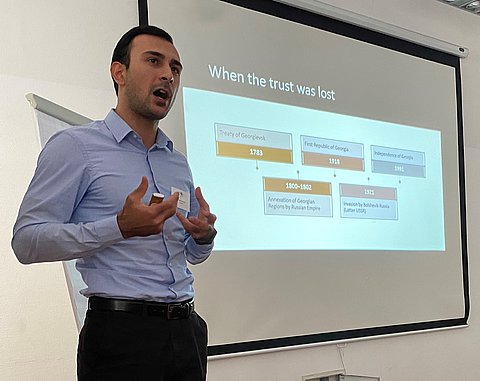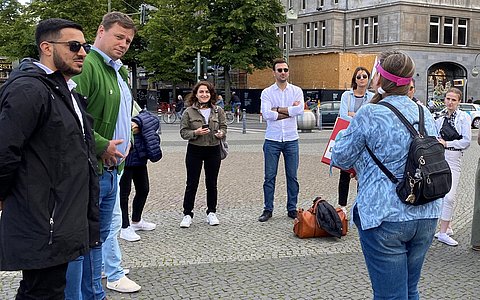After an introductory lecture on the history of the Russian hegemonic dominion by the Head of the Eastern Europe Department, Markus Leimbach, the current situation was examined in more detail in the following three participants’ presentations. Prof. Dr. Cezary Koscielniak explained the historical background and economic impact and pointed out that Polish-Russian relations had always been linked to relations with Germany. The Georgian political scientist Tornike Kikishvili described above all the various threats and conflicts between Russia and Georgia as well as their economic dependencies. One of his central statements was that Georgia’s future lied in Europe. The Hungarian theologian Gabor Kiss presented the situation of the Catholic Church in Hungary during the communist regime in a video contribution. The travel restrictions imposed by the Hungarian government prevented him from travelling to Berlin.
The participants then discussed the topic in two different groups and presented the results to the plenum. The two main issues in the relation with Russia were mainly economic dependence in trade and energy supply, and Russia’s direct influence through the deployment of armed forces, as in Ukraine and Georgia. On the one hand, the participants hope for a stronger EU support in these specific cases, but also that the respective cultural and national autonomies are respected by the EU member states. With hindsight, the stability and long period of peace brought about by Soviet rule was viewed positively, albeit at the price of the oppression exercised. The closing remarks for the seminar came from the Russian poet Fyodor Tyutchev who wrote: No one in their right mind can understand Russia.
The seminar was rounded off with a city tour on the subject of “Charlottengrad – Russian life in Berlin”, which took the participants into the twenties of the 20th century, and with a mass organised by KAAD’s spiritual counselor, Prof. Dr. Ulrich Engel OP at KSG Edith Stein.





